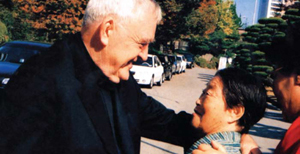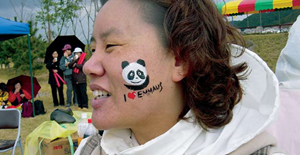A Path to Life
By Fr Peter Woodruff
Fr Noel O’Neill was ordained in Ireland in December 1956 and has been working in Korea since 1957. Fr Peter Woodruff is an Australia Columban who worked in Peru for many years. Ordained in 1967, he is now based in Essendon, a suburb of Melbourne, at the headquarters of the Columbans in Australia and New Zealand.
 Columban Fr Noel O’Neill, spoke to the staff of our mission office in Essendon, Melbourne, Australia, about his experience with intellectually disabled people in Korea. Father Noel arrived in Korea in 1957, not long after the Korean War ended in 1953. The whole country had been devastated by war and was still in the throes of reconstruction. Like most Columbans at that time in Korea, Father Noel began his mission work building up and running parishes; this was his mission for 24 years.
Columban Fr Noel O’Neill, spoke to the staff of our mission office in Essendon, Melbourne, Australia, about his experience with intellectually disabled people in Korea. Father Noel arrived in Korea in 1957, not long after the Korean War ended in 1953. The whole country had been devastated by war and was still in the throes of reconstruction. Like most Columbans at that time in Korea, Father Noel began his mission work building up and running parishes; this was his mission for 24 years.
He was working in Kwangju when he began to go to the Mudeung Institution which gave support to needy and marginalised people. He soon saw that the intellectually disabled were not able to fend for themselves so he began to sit and chat with them. They were definitely the forgotten ones of Korea in those days. Many would have been left to die at birth and those who survived would be kept hidden by their families, who were embarrassed by their very existence.
 One day Father Noel was called to the hospital to visit You Ha, a young intellectually disabled woman from the Mudeung Institution, who was quite ill. She looked up at him, her eyes bright and clear, and said, ‘Kamsahamnida’ (thank you) and breathed her last. Since You Ha had no immediate family members the hospital intended to use her body for medical research but Father Noel, on learning this, opted to take charge of her funeral arrangements and give her a decent Christian burial.
One day Father Noel was called to the hospital to visit You Ha, a young intellectually disabled woman from the Mudeung Institution, who was quite ill. She looked up at him, her eyes bright and clear, and said, ‘Kamsahamnida’ (thank you) and breathed her last. Since You Ha had no immediate family members the hospital intended to use her body for medical research but Father Noel, on learning this, opted to take charge of her funeral arrangements and give her a decent Christian burial.
Each year, at the time of the harvest festival, he visits her grave. In her dying moments she had shown him a path to life. Father Noel became increasingly involved with the intellectually disabled and won support from the Columbans and the local bishop to dedicate himself full-time to working with them. He also met opposition from Columbans who did not approve of any priest leaving the parish mission to do some kind of social work. Koreans also had serious reservations about a priest doing such work because for them the intellectually disabled were no more than an unfortunate and most embarrassing phenomenon that was basically the result of evil spirits (Shamanism) or a bad life in a previous existence (Buddhist idea of reincarnation). Then there was the Confucian idea that humans were either wise or stupid and of course the intellectually disabled were extremely stupid.
Clearly solidarity with the intellectually disabled was not merely about being with them, giving them a hand and making friends with them. The attitudes of all sectors of society needed to be challenged and transformed. The challenge of love was to find ways to transform the social milieu so that the intellectually disabled might be able to feel part of society, not shunned and shut away as an embarrassment to all.

Father Noel travelled to Australia to look for ideas. Columban Fr Peter Toohey introduced him to L’Arche in Sydney and urged him to go to Canada to experience living in one of Jean Vanier’s L’Arche communities there. His eyes were opened by the way volunteers treated with profound respect the intellectually disabled people. It was for him like the experience of the two disciples on the road to Emmaus when their eyes were opened as they broke bread with the stranger who had joined them along the road. They showed him how precious is the dignity of the human person who has been devalued by society.
The major challenge was to change people’s mentality. Even the Church leadership was supporting policies to maintain the intellectually disabled in isolation. The basic strategy for change was to get the intellectually disabled out of isolation as regards housing, work, cultural activities and social life. By mixing with others the intellectually disabled would change the way they were perceived, so the intellectually disabled themselves were to be the key to changing entrenched social attitudes.
Father Noel has found support from many quarters, government, religious organisations, other institutions and individuals. With this support he has been able to bring the intellectually disabled out of isolation, to live in apartment blocks with the rest of the community, to work alongside others who are not disabled, to participate in religious communities, to produce beautiful products that are exhibited and sold in public places. He has successfully challenged the accepted wisdom of keeping ‘them’ hidden; he has made ‘them’ visible. He states clearly that for all this to begin to happen all that is required is that we respond positively to the one question that intellectually disabled people ask us: ‘Do you love me? Will you come out to a meal with me? Will you take a walk with me? It’s the fundamental question of the gospel, Do you love me?’